Cover image: Maya Q’eqchi’ residents of Santa Elena, in the department of Petén, are criminalized by the oil palm company Industria Chiquibul. Photo: Luis Hub/ Prensa Comunitaria
Santa Elena is an Indigenous Maya Q’eqchi’ community in the municipality of Sayaxché, in the department of Petén, located in the north of Guatemala, near Río Salinas. In this region the heat is intense. In the past, water flowed abundantly with lush landscapes and rainforest. Today the rainforest lies in ashes under the immense oil palm plantations.
The community has been cornered in by the oil palm plantations. On the scarce land they still have left, they plant corn, beans, chili, and yucca. Some families raise livestock. Daily survival is complicated more by the polluting of the rivers and springs, a consequence of the monoculture crop.
With scarce land and without work, a part of the population, principally men, migrate to the United States with the hope of bettering their living conditions. Others are forced to submit to degrading work on the oil palm plantation.
Industria Chiquibul, an affiliate of the company Unisource Holding, is an exporter of different agricultural commodities like sesame seed, crude palm oil, and cardamom. They are also involved in the importation, commercialization, and distribution of fertilizers in Latin American markets. Today they possess around 70 caballerias (Over 7400 acres) of oil palm plantations surrounding this Maya community.
This crop first arrived to this region in 2012, when they began buying up lands of the Maya Q’eqchi’ families. “They told us that our lands were going to be flooded because they were going to build a hydroelectric dam on the Usumacinta River,” remembers the Indigenous Maya Q’eqchi’, Mario Pop Tux, one of the community leaders, during an interview with Avispa Midia.
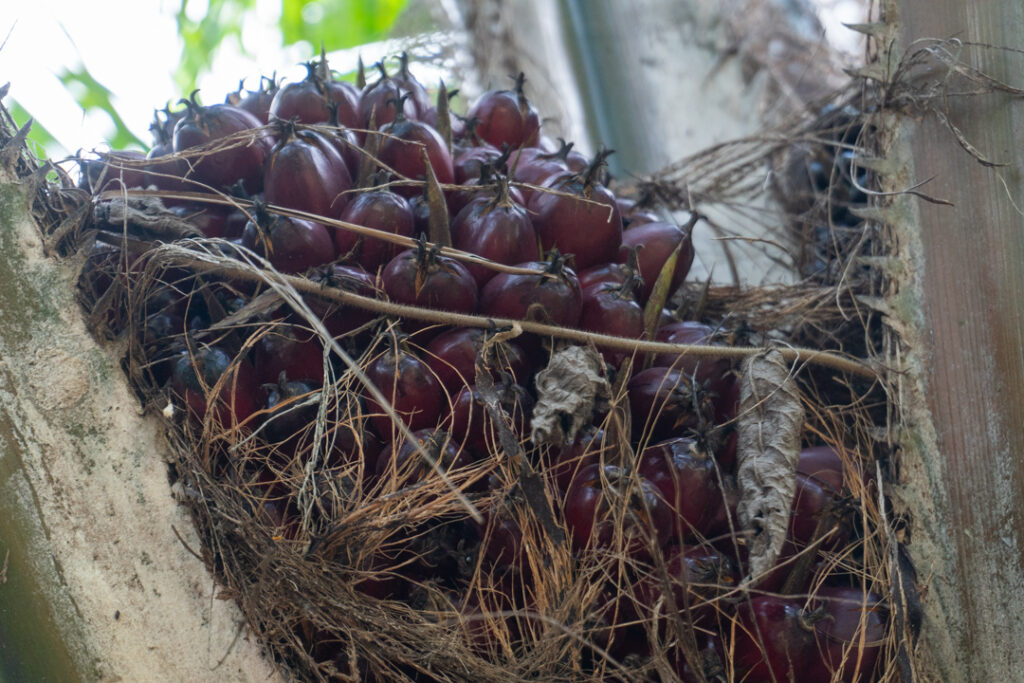
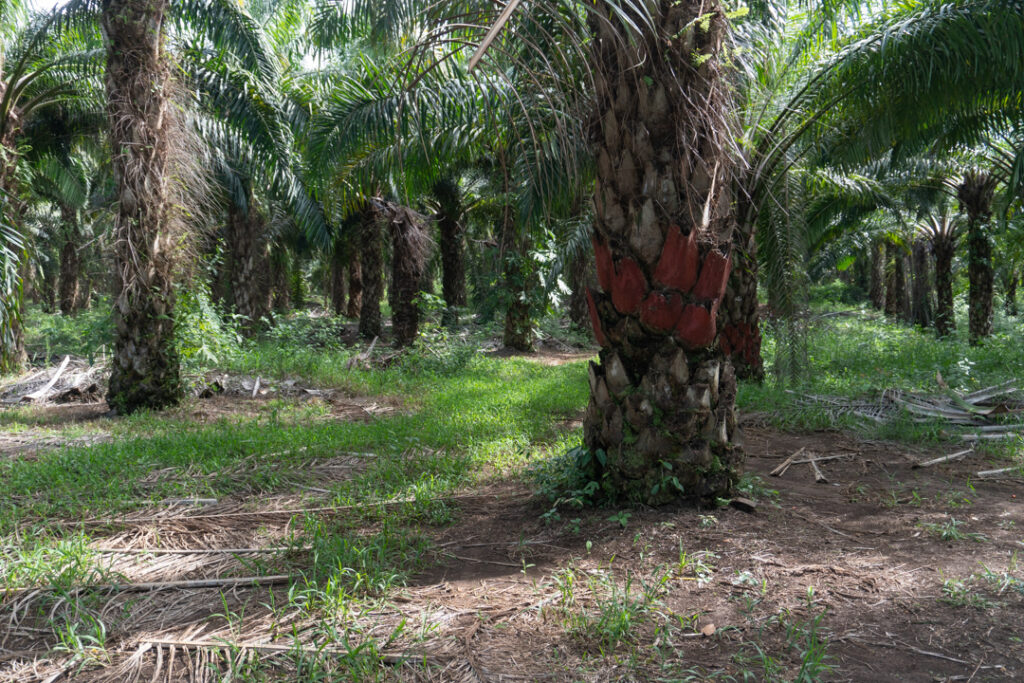
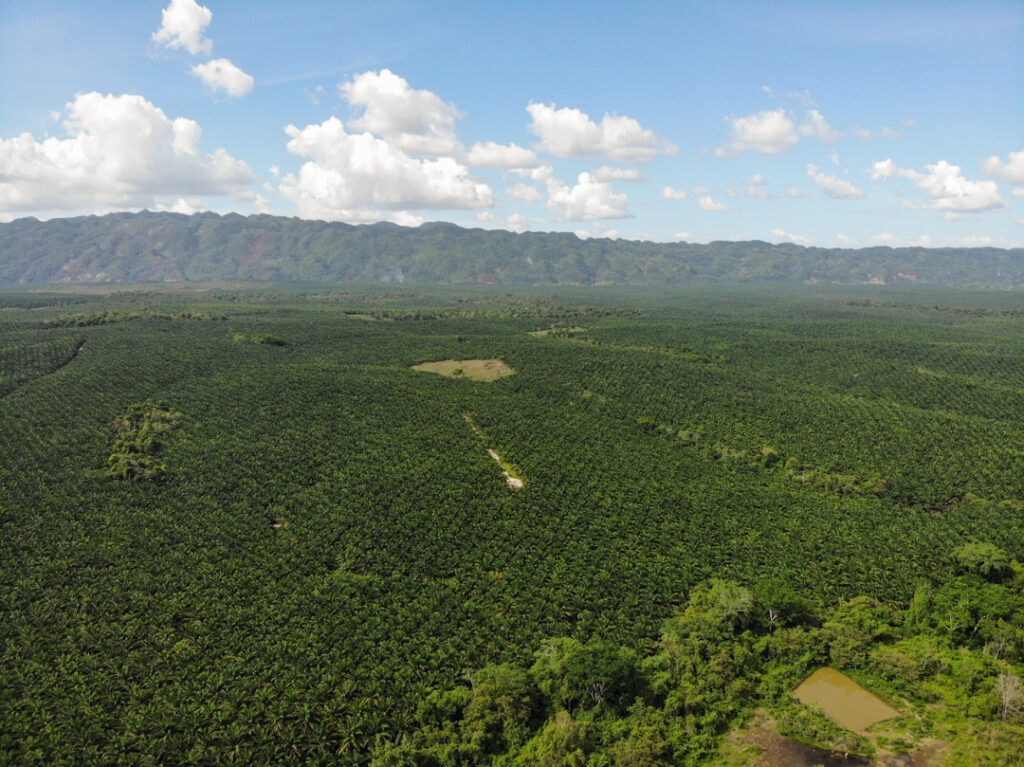
This industrial crop also arrived with a military detachment that was constructed near the community. Now there is a presence of soldiers, National Civil Police (PNC), and armed company security. “They carry out patrols during the day with their faces covered, as if they are criminals,” comments Pop Tux. The patrols are also done from the air. The community members report drone flyovers, principally at night.
The arrest warrants are a constant threat. According to the Maya Q’eqchi’, there are five arrest warrants against community members of Santa Elena, ex-workers of the company who have struggled for their labor rights. “We are aware that they could do the same as they have done in the past. They could invade the community, causing terror amongst the women, children, and elders, beneath the justification that they are looking for our criminalized compañeros,” he said.
In a community assembly—the maximum authority in the community—in February of this year, local authorities, elders, and community members wrote out an act documenting the different “incidents” in the last two months which have marked the intensification of violence against Santa Elena.
One of these incidents was the private company security intimidating a member of the community, on January 31, at a security checkpoint.
Persecution for Demanding Rights
The persecution of residents of Santa Elena is not something new. After Chiquibul bought lands, they began to contract workers from different communities to cut down trees and plant oil palm. The working conditions offered by the company were described as “modern slavery” by the lawyer of the Bufete para los Pueblos Indígenes, Juan Castro. They worked more than 12 hours a day for $4.40 dollars.
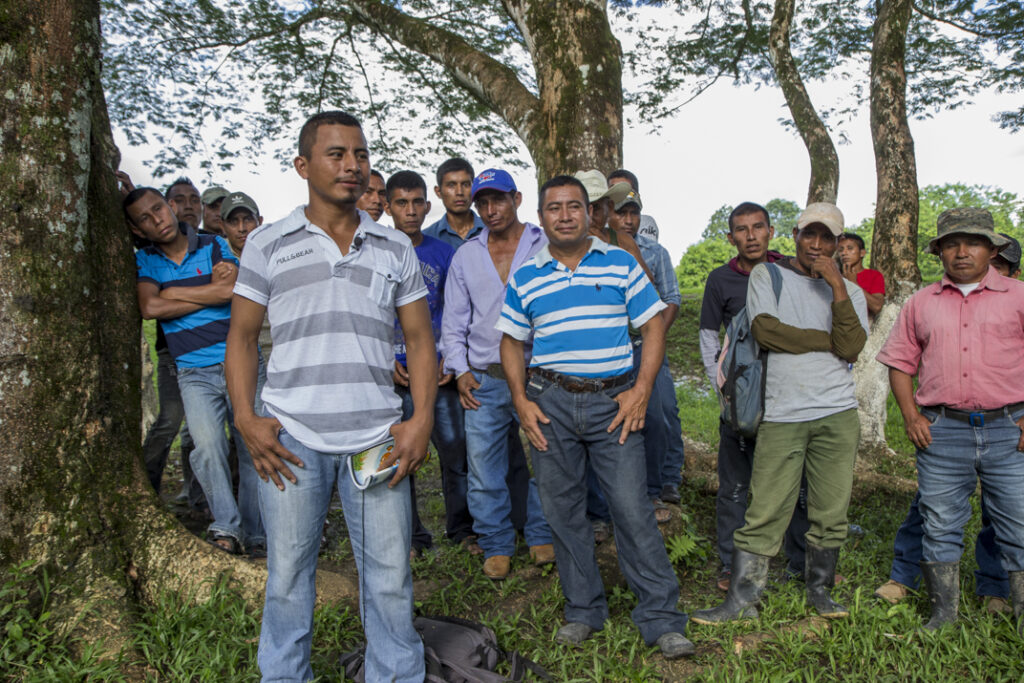
The situation became unsustainable for the Indigenous people, coming to a head in 2019. The company contracted 300 people, yet when they finished their one-year contract, Chiquibul didn’t pay them the agreed upon amount. The worker’s committee, which was created in 2016, visited the Ministry of Labor and calculated that each worker should receive—adding severance, salary, bonus—$12000 quetzales (US $1500), but the company only paid the $4800 quetzales (US $615 dollars). That is to say, less than half the amount.
Then a worker’s general strike broke out. The Indigenous people of Santa Elena and the community carried out a series of actions denouncing the company. Even so, the company didn’t pay the workers. On the contrary, the company began a process of criminalization against members of the community.
The company denounced leaders of the workers in the courts, which resulted in six arrest warrants against community members. In November 2022, four indigenous people were captured and detained, including Mario Pop Tux, accused of kidnapping, extortion, aggravated usurpation, and illegal detention. “We were in prison for 73 days,” says Pop Tux.
In February 2021, the courts dictated a condemnatory sentence against four community members of Santa Elena. “With this sentence, we see how the state is accomplice to these forms of modern exploitation. They do not understand the context of land grabbing and Indigenous exploitation,” said the lawyer that accompanies the workers and members of the community, Juan Castro.
The sentence was for four years, but with conditional suspension. That is to say, they have to present themselves monthly to the public prosecutor’s office in the municipal seat of Sayaxché to sign documents. “The Indigenous peoples are considered responsible and not the companies that are damaging the environment and the life of many communities,” says the lawyer Juan Castro.
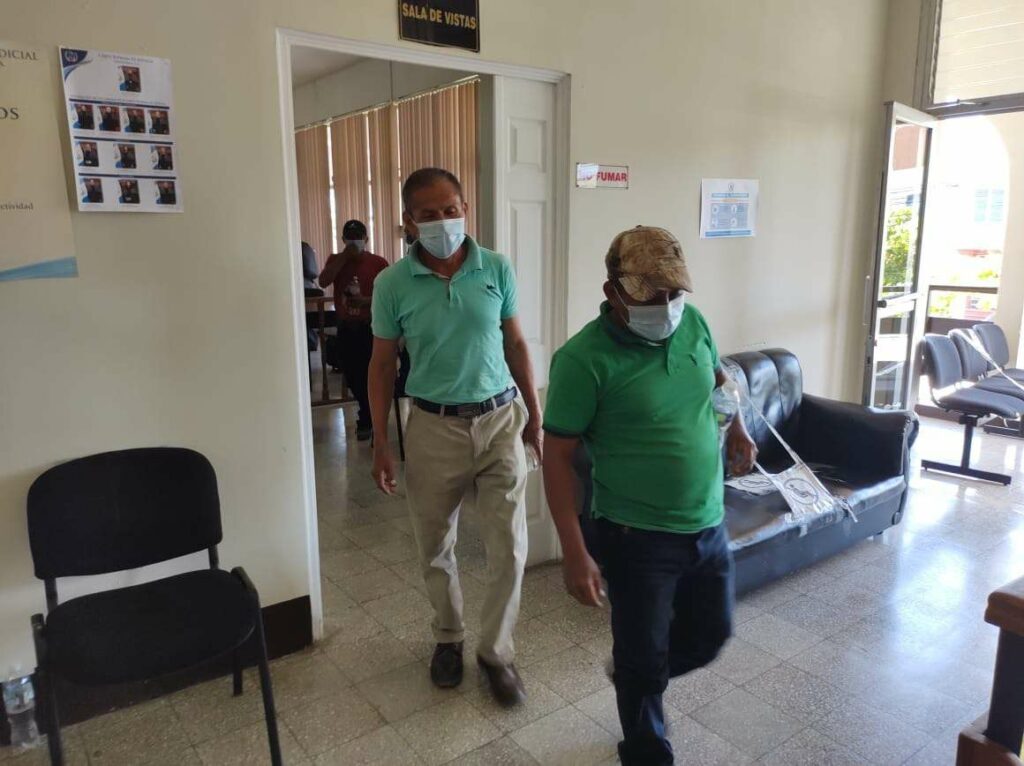
There was an expectation that after the condemnatory sentence of the Indigenous Maya Q’eqchi’ and the end of the strikes—since then the company has brought in workers from outside the region—that the persecution of Santa Elena would stop. But that’s not what has happened. “They’ve continued to harass us up until today. They continue to scare us, surveil us, control us. They don’t stop terrorizing us,” explains Pop Tux.
Certify the Crops Using Indigenous People
At 7:00am on January 25, 2024, Carlos Cú, representative of Chiquibul, accompanied by two others, came looking for the President of the Community Development Council (COCODE) of Santa Elena, José Caal Pop, at his house. He was not there because he had gone to work on his land. The representatives of the company decided to leave. At around 12:00pm, Caal Pop returned home. Shortly after, the three men returned looking for him.
They presented him a document asking that he, as the president of COCODE, sign it. “They were summoning me to a meeting related to the certification of the company. That’s what they told me. And they wanted me to sign the document for the meeting.”
According to Indigenous Maya Q’eqchi’, the workers of Chiquibul wanted to minimize the conflicts between the company and the community. “Carlos Cú (one of the signers of the document) said to me: we’ve come to speak to you directly. We want you to give us that opportunity. We know that there is no problem (with the community). We want you to sign this document for us. So that there is no problem.”
Caal Pop didn’t remain silent. “I told them, how is there no problem? If we are being surveilled all the time. They didn’t like what I said and they left,” explains the Maya Q’eqchi’.
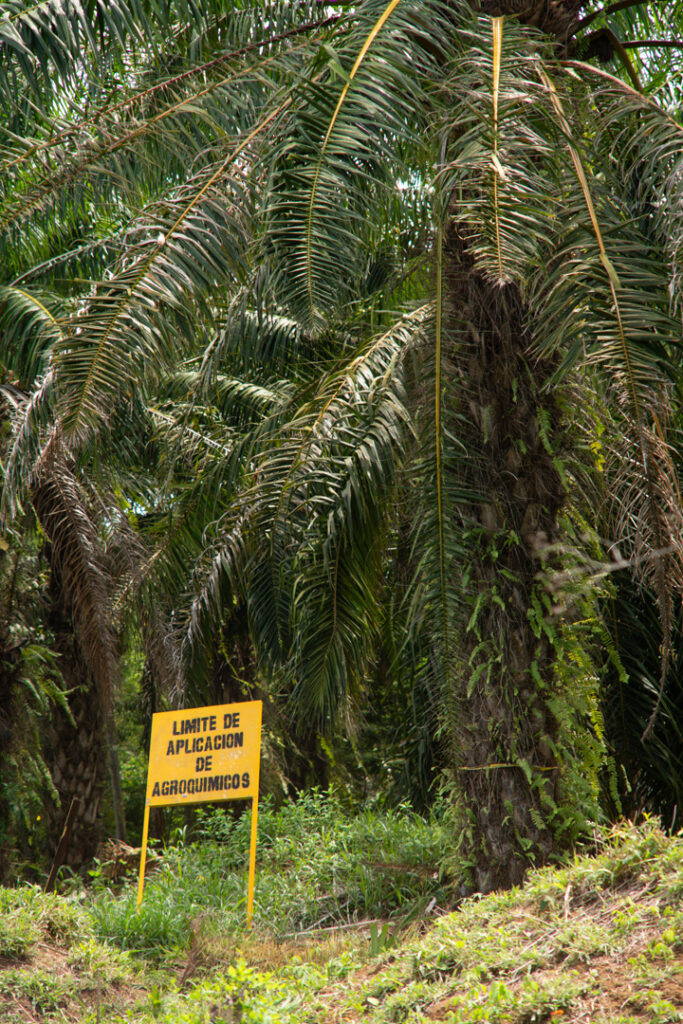
In July of 2023, the company began the process for the certification of their oil palm plantations by the worlds leading palm certifier, the RSPO (Roundtable on Sustainable Palm Oil). The objective is to obtain certification this year 2024.
The certification will allow the company to expand its sales in North American and European markets. The palm oil of Chiquibul is already part of the supply chain of European companies like Dreyfus Company (LDC), Nestle S.A., Upfield Holdings B.V., Henkel AG & Co., KGaA, PepsiCo Inc., Vandemoortele. These chains were tracked by the German organization, Christian Initiative Romero (CIR), and recently published in the report Im Schatten der Ölpalme.
The Spanish company Lipsa, the British company Unilever, the German company Basf, the Dutch companies Lowis Dreyfus and Marie Olie, and the French company ADM-SIO also were traced as buyers of Chiquibul oil products, in a still unpublished investigation done by the Dutch project, SOMO The Counter, commissioned by the CIR.
Guatemala in the World
The majority of the palm oil consumed worldwide comes from Indonesia and Malaysia. However, the CIR report argues that there are more and more oil palm plantations in Latin America to satisfy the world demand. Guatemala and Colombia are already fourth and fifth on the list of national exporters.
The largest buyer of Guatemalan palm oil is the Netherlands, with 32% of the total volume, according to the report. In the case of Germany, Guatemala has become the second most important provider, after Malaysia. Given that 43% of the palm oil resold by the Netherlands goes to Germany, it is likely that the total share of palm oil from Guatemala that goes to Germany is still greater, emphasized the German organization.
According to a report from Industria Chiquibul, the process of certification is already happening. “A group of external advisors visited our plantations and together, with our sustainability team, have established a plan of action which will be centered on people, planet, and prosperity to achieve our sustainability,” says the company in their document.
One of the obligatory points for certification is a consultation with the communities affected by the palm plantations, that began on February 14.
The document presented to Caal Pop for his signature, of which the Avispa Midia team has access, explained that it is a process of “free, prior, and informed consent (COP)”, that seeks to “establish a relation of confidence between the company and communities, where the communities can get to know the company, be clear about their rights, and can express their concerns and worries related to the operation of the company.”
In their explication, they do not mention Convention 169 of the International Labor Organization which states that the communities have the right to say “no” to projects in their territories. In real terms, it is a process that is ignored, because they have already deforested and are currently cultivating grand extensions of oil palm. “We did not participate in the meeting and we are not going to participate in the following ones. What they want is our signature for the certification, and they aren’t going to get it, because the consultation doesn’t exist,” said Mario Pop Tux.
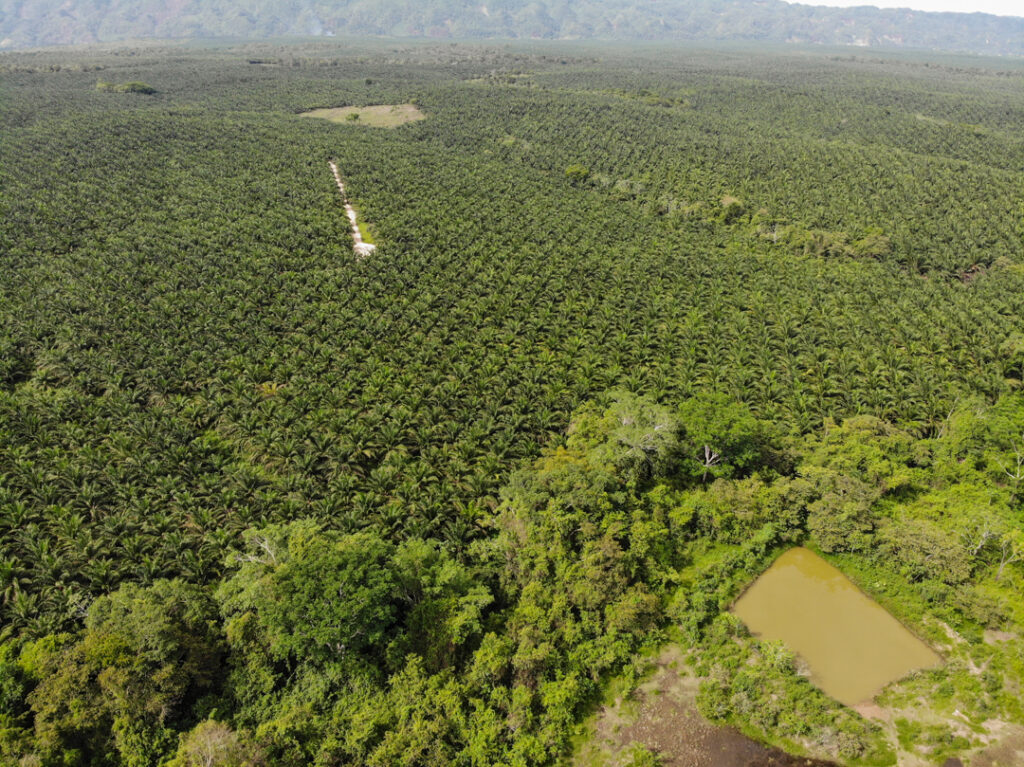
According to the Pop Tux, around 18 villages are impacted by Chiquibul’s palm plantations in the region. Beyond Santa Elena, there are at least another 10 villages that do not agree with the presence of the company, where the company implemented the same shady mechanisms. “For this first meeting, they invited all of the communities, many didn’t go. They also suffer persecution and arrest warrants,” he said.
The company will also have to carry out two other processes. The High Conservation Value Assessment “to identify the social and environment values both within the areas where the company carries out its operations, but also in its areas of influence,” says the document. In reality, they are going to map the forests that they couldn’t deforest, including forests that are not on their lands, to establish conservation programs, which are pivotal to obtaining the certification they are looking for.
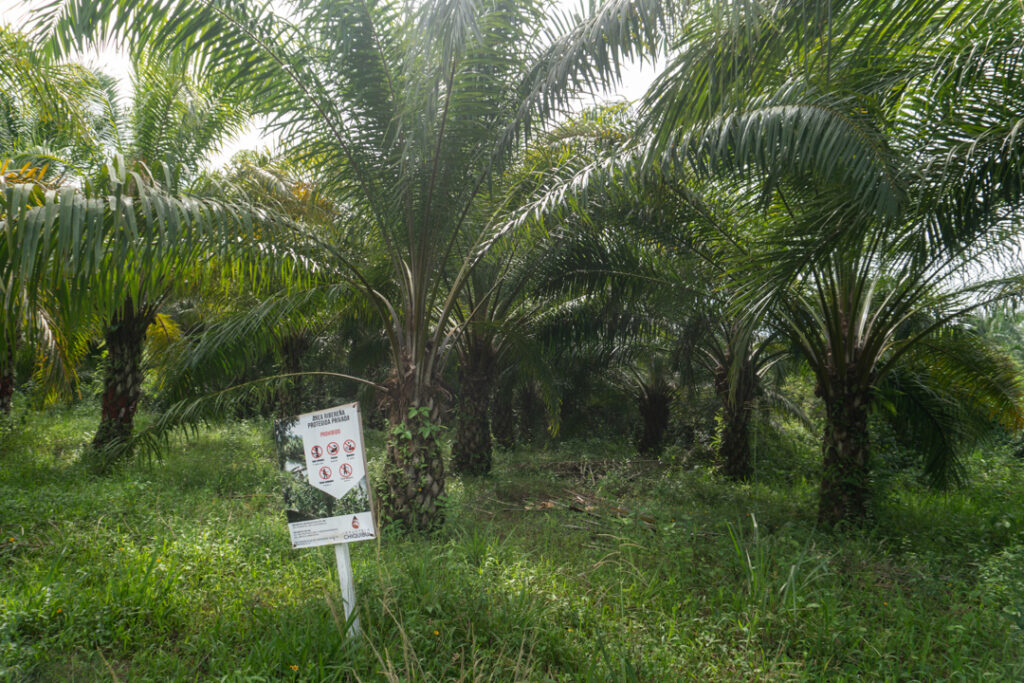
In addition, they must also carry out a Social Impact Report with which they will identify “the social and environmental impacts that the company could be generating, and at the same time organize a management plan to control, mitigate, and compensate these impacts,” according to the document of Chiquibul.
Bio Terra Consultores Ambientales will be the company responsible for carrying out these studies. They were contracted by Chiquibul.
Meanwhile, the RSPO certifier has been criticized throughout the world for certifying companies that have generated socio-environmental conflicts. By labeling palm oil “sustainable,” palm oil’s image is rehabilitated giving the impression that the industrial cultivation of oil palm is compatible with principles of ecology and human rights, and that it offers a long-term sustainable solution for the use of the land. “However, that is not the case,” says CIR.
According to the German organization, the RSPO allows, for example, the partial use of pesticides that appear on the Pesticide Action Network’s list of highly hazardous pesticides. Furthermore, inspectors for the certification process are contracted by the companies themselves, as is the case of Bio Terra Consultores Ambientales, “which can lead to conflicts of interests in practice. There is a great risk of corruption.”
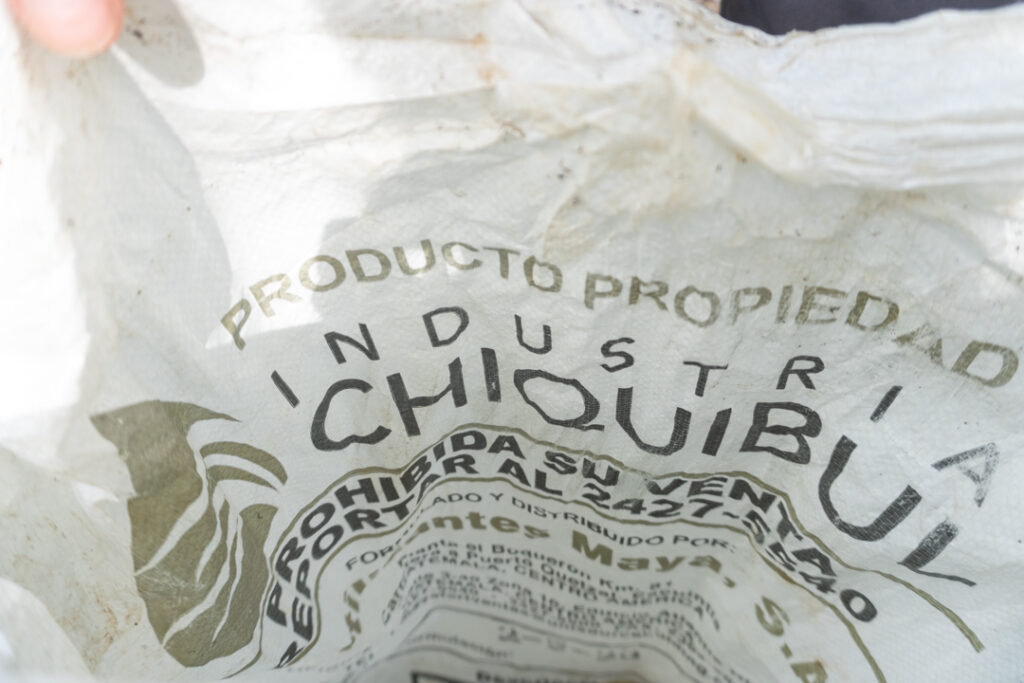
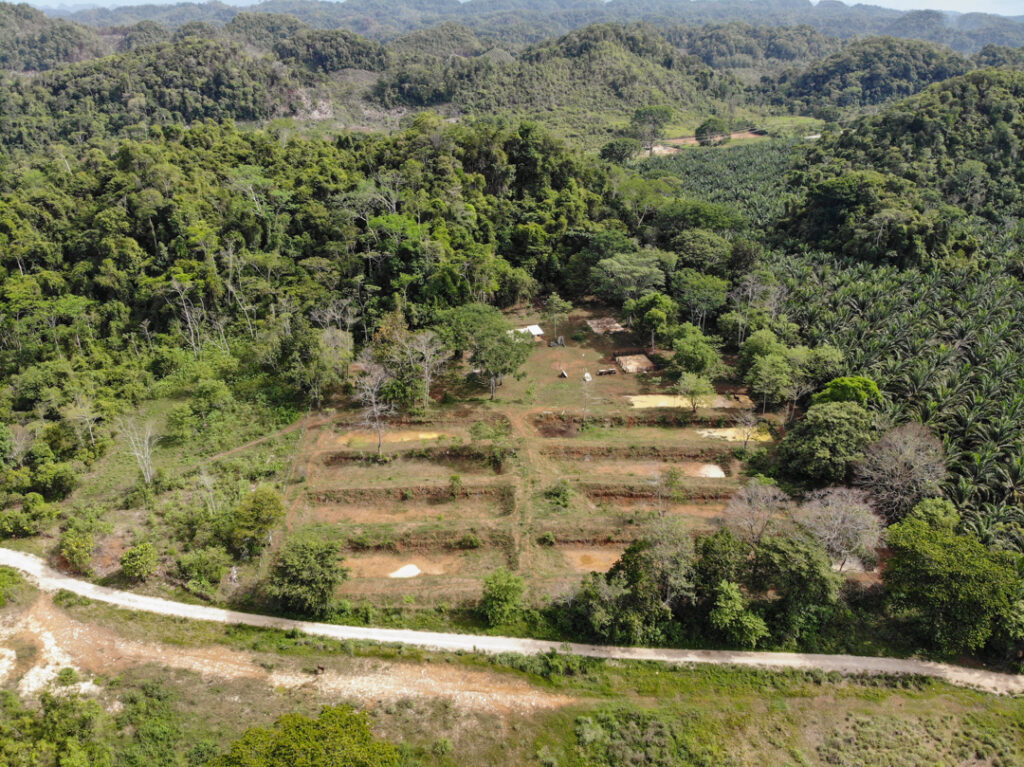
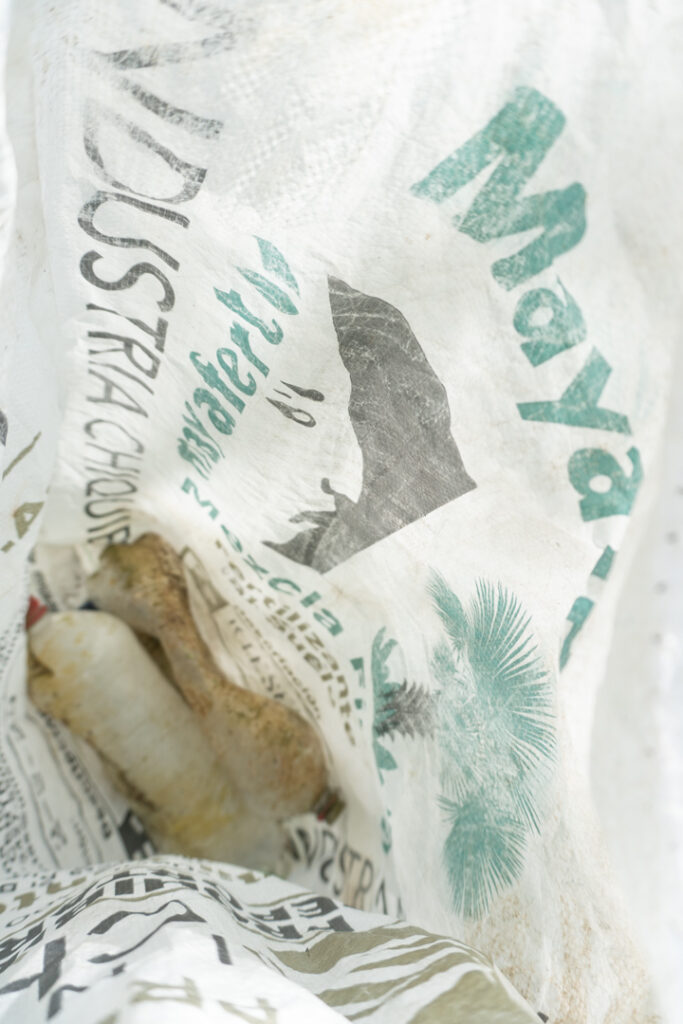
The Community of Santa Elena reiterated in an assembly their rejection of the certification. “These certifications we profoundly reject for the violations of our human rights. Threats, intimidation, environmental contamination, deforestation, exploitation of the rivers where the community gets its drinking water.”
Disappearing the Certified Document
The president of COCODE also denounced the public prosecutor for having disappeared the community certified document of Santa Elena. This document is very important for a Maya Q’eqchi’ community. In it we capture the agreements, the norms, the commitments of the community, the results of the assemblies. These types of documents are very important for each one of the communities of our Q’eqchi’ people,” explains Caal Pop to Avispa Midia.
Mario Pop Tux explains that on May 6, 2021, the local authorities were summoned—the auxiliary mayor and the representative of COCODE of Santa Elena—by the Municipal government. On May 7, they went to the municipal offices. The mayor was not there, but a prosecutor from the public prosecutor’s office was. “This prosecutor disappeared the certified document without explanation,” he sustains.
According to the president of COCODE, the municipal government’s commitment was recorded, from an assembly in the community, that they would recover seven caballerias, today in possession of Chiquibul, for the families of Santa Elena.
“We believe that this agreement was the reason for which they disappeared the document. The value of the work that is in the document, it is very valuable to us. We demand that they return it to us peacefully. And that the municipal authority complies with it,” said Caal Pop.
Petition
The Movement of Communities in Defense of Water, Qana’ Ch’och, the Coordination of NGOs and Cooperatives (CONGCOOP), and the World Rainforest Movement (WRM), launched a petition demanding the authorities of Guatemala to take urgent measures against the harassment and violation of human rights enacted by Industria Chiquibul against the community Santa Elena.
According to the organizations, this pattern of violence is intrinsic to the palm oil industry. In the last decade, they sustain, the company Industria Chiquibul has accumulated a trail of violations of the rights of Indigenous and campesino communities, including the illegal appropriation of community lands in the village of Carolina, contamination of the San Román river, criminalization via arrest warrants, and detentions orchestrated by the company, labor violations, and deforestation.
They demand “an end to the arrest warrants against community members which are based on false accusations, and an end to the process of certification of Industria Chiquibul before the RSPO.”
Oil Palm in Petén
In the department of Petén, where the municipality of Sayaxché and the community of Santa Elena are located, oil palm cultivation has increased exponentially. According to the report from 2021, Dinamicas productivas entorno al cambio de uso del suelo y sus repercusiones en la Reserva de Biosfera Maya (RBM), done by the Center for International Forestry Research (CIFOR), in 2000 there were 320 hectares and by 2022 there were 78,921 hectares, 46% of the nation’s total.
The growth at the national level between 2005 and 2010 was 20%, in Petén it was 192.4%
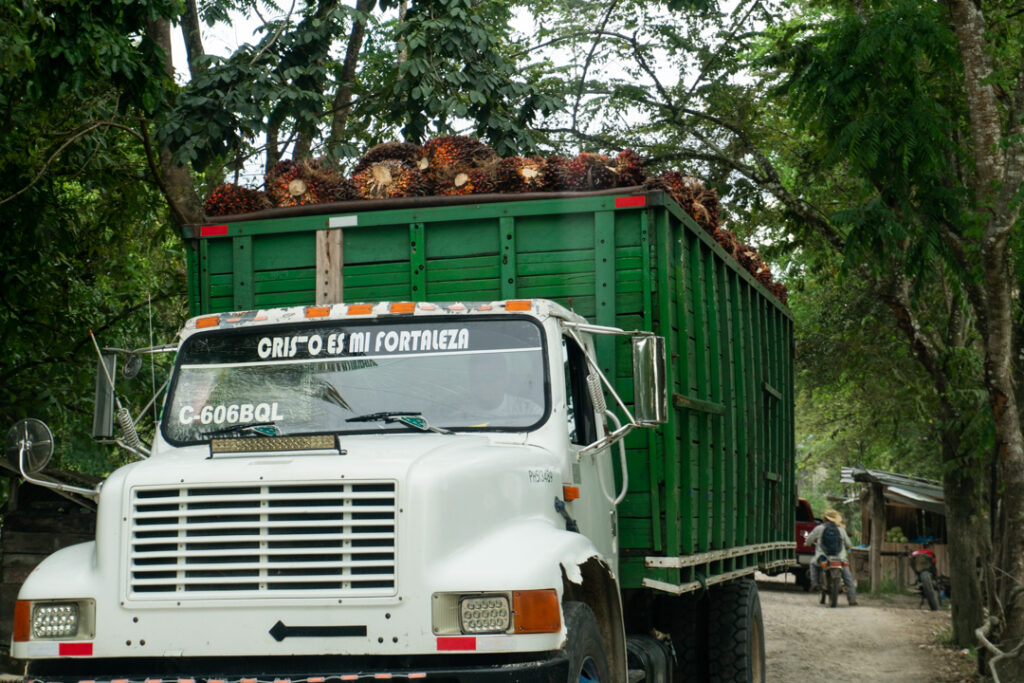
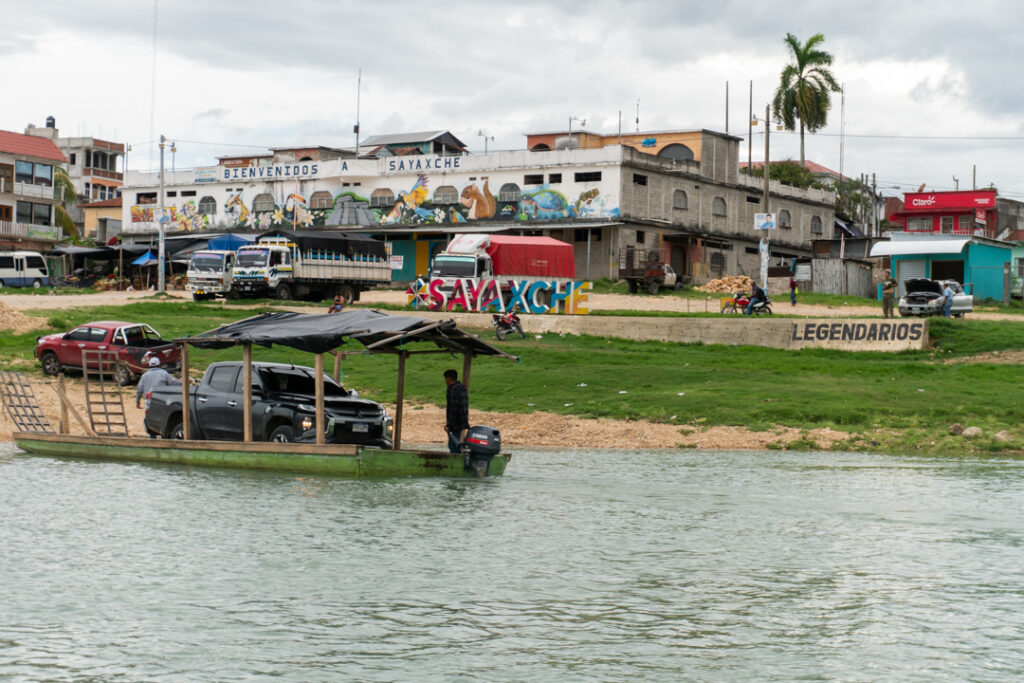
The production of palm in the municipality of Sayaxché represents 87% of the production in the department of Petén, according to data from 2018-2019 generated by the Gremial de Palma.
Indonesia, India, China, and the European Union are the countries that consume the most palm oil, according to the Foreign Agricultural Service of the United States Department of Agriculture, with statistics from July of 2023. The worldwide consumption has increased more than 80% in the last 15 years.
“As a result, the cultivation in Central America is expanding, with negative consequences for the local communities and the environment,” summarizes the CIR.
RSPO Response
In a communique updated on March 15, 2024, the RSPO reported that it is aware of the CIR report. The organization assures that it has taken the necessary steps to review the allegations in the report and that it is working closely with the companies implicated to get a complete understanding of the situation.
The RSPO maintains that it continues to monitor this case with the objective of ensuring that the palm oil products “are being produced in a responsible and sustainable manner in accordance with RSPO standards.”
Text updated March 18, 2024.

